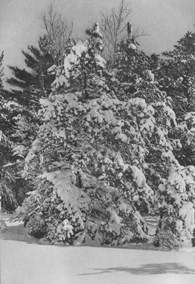
Henry Thoreau liked to get his feet muddy; all nature was a tonic for him. Nearly every day, year round, he was out walking — exploring and studying every nook and cranny in Walden Woods, Estabrook Woods, and the rest of Concord, and recording in his journals in vivid detail what he heard and smelled and saw. On warm Sunday mornings, he waded up to his shoulders in the Concord River while his neighbors sat high and dry in their church pews. While his neighbors tilled their fields, he climbed the tallest white pine trees he could find in a search for bird nests, pine cones, or a fine view. Thoreau’s study of how plant seeds are spread led to his theory of forest succession, accepted today as a key contribution to the field.
But beyond his superb talents as observer and naturalist lay Thoreau’s passion to explore deeper meanings in nature. “The hen-hawk (red-tailed hawk) and the pine are friends,” he wrote in his Journal in 1859. “What we call wildness is a civilization other than our own.” Writing in his classic book, Walden, about the ties between people and nature, he says, “Our village life would stagnate if it were not for the unexplored forests and meadows which surround it.” And he adds, “We need the tonic of wildness, — to wade sometimes in marshes where the bittern and the meadow-hen [American coot] lurk, and hear the booming of the snipe; to smell the whispering sedge where only some wilder and more solitary fowl builds her nest, and the mink crawls with its belly close to the ground.”
As his understanding and intimacy with the world of nature developed, Thoreau became one of its earliest champions. Watching Concord stripped of its forests for farming and fuel-wood, and seeing the village expand into the countryside, Thoreau looked to the future and raised new possibilities. “Each town should have a park, or rather a primitive forest, of 500 or a thousand acres, where a stick should never be cut for fuel, a common possession forever, for instruction and recreation,” he wrote.
Largely overlooked during his lifetime, he is now praised as one of the nation’s most powerful voices for the natural environment. “In Wildness is the preservation of the World,” he wrote, and with such statements helped shape the thinking of modern day environmentalists. Today countless people point to Thoreau as the father of this century’s environmental movement.
Thoreau is an American original — an amazing mix of land surveyor and pencil designer, naturalist and social reformer, poet and philosopher. But Thoreau himself had something perhaps more revealing to tell us about himself and his work. “My profession is always to be on the alert to find God in Nature, to know his lurking-places, to attend all the oratorios, the operas, of nature.” In a river, he found the flow of eternity; climbing a mountain he felt his spirit move closer to God. “I believe in the forest, and in the meadow, and in the night in which the corn grows.” It was as though he could see through Nature to a glimpse of the divine. What might sound to us like a contradiction made perfect sense to him: “Heaven is under our feet as well as over our heads.” Exalting his own small world of Walden Pond and Walden Woods and the Concord countryside, Henry Thoreau exalted nature for all of us everywhere.

